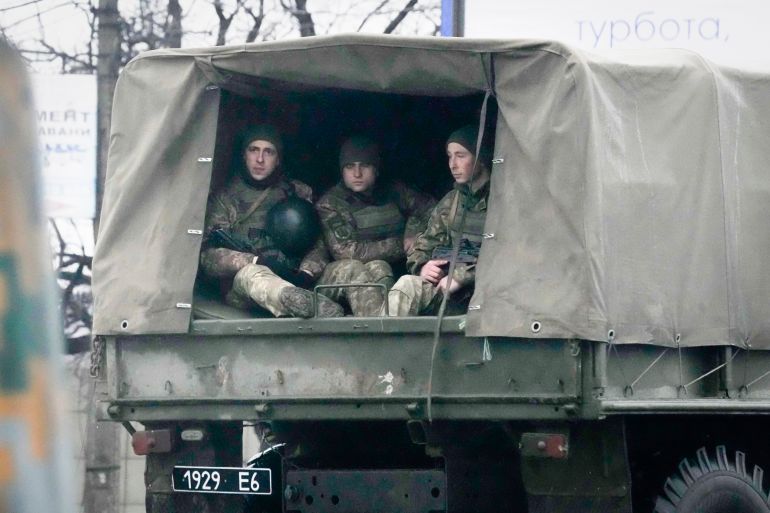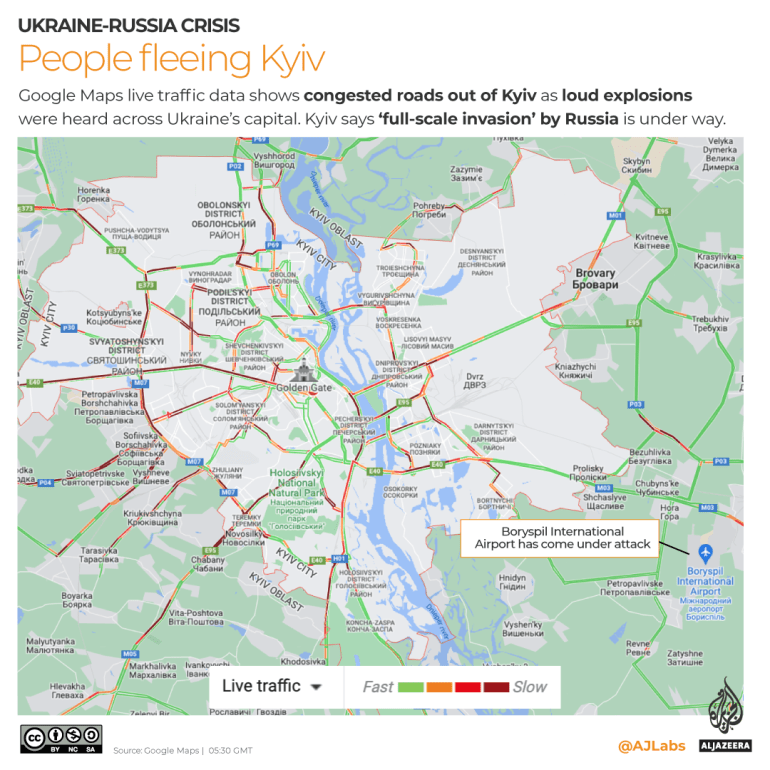Why is Russia attacking Ukraine? What we know so far
Putin launches multi-pronged attack on Ukraine: How did the invasion start and what has happened so far?

Russian President Vladimir Putin has launched a military operation in Ukraine, with explosions heard across the country and Ukraine’s foreign minister warning a “full-scale invasion” was under way.
What do we know about the invasion so far?
Keep reading
list of 4 itemsRussian forces launch full-scale invasion of Ukraine
World reacts to Russia’s attack on Ukraine
Ukraine: EU sanctions Russia defence minister, military chief
The build-up to war
Weeks of intense diplomacy and the imposition of Western sanctions on Russia failed to deter Putin, who had massed between 150,000 and 200,000 troops along the borders of Ukraine.
Russia has demanded an end to NATO’s eastward expansion and said Ukrainian membership of the US-led Atlantic military alliance was unacceptable.
Shelling had intensified since Monday when Putin recognised two separatist regions as independent and ordered the deployment of what he called peacekeepers, a move the West called the start of an invasion.
In response, Western countries and Japan have imposed sanctions on Russian banks and individuals.
On Wednesday, the separatists issued a plea to Moscow for help to stop alleged Ukrainian aggression – claims the United States dismissed as Russian propaganda.
As it appeared Russia was preparing to attack, Ukraine’s President Volodymyr Zelenskyy made an emotional address to the nation, saying the war would be “a big disaster”.
“If they try to take our country away from us, our freedom, our lives, the lives of our children, we will defend ourselves,” he said
On Thursday morning, Putin said he had authorised military action to defend itself against what he said were threats emanating from Ukraine.
Russia invades Ukraine
Ukrainian President Zelenskyy said Russia had carried out missile strikes on Ukrainian infrastructure and border guards, and that explosions had been heard in many cities. An official also reported non-stop cyberattacks.
Zelenskyy said that martial law had been declared.
Ukrainian media reported that military command centres in Kyiv and the city of Kharkiv in the northeast had been struck by missiles while Russian troops had landed in the southern port cities of Odesa and Mariupol.
Russian troops attacked Ukraine from Belarus as well as Russia with Belarusian support, and an attack was also being launched from annexed Crimea, Ukraine’s border guard service said.
Russia’s defence ministry said it had taken out military infrastructure at Ukrainian airbases and degraded its air defences.
Ukraine closed its airspace to civilian flights citing a high risk to safety, while Russia suspended domestic flights at airports near its border with Ukraine until March 2.
Russian-backed separatists in the east said they had captured two towns, the RIA news agency reported.

What has the reaction been?
The invasion triggered swift condemnation.
US President Joe Biden, who has ruled out putting US troops on the ground in Ukraine, said Putin had chosen a premeditated war that would bring a “catastrophic loss of life and human suffering”. He said he would speak to G7 leaders and promised Russia would be held “accountable”.
NATO Secretary General Jens Stoltenberg condemned Russia’s “reckless and unprovoked attack” and said NATO allies would meet to tackle the consequences.
UN chief Antonio Guterres urged Russia “in the name of humanity” to step back from what could be “the worst war since the beginning of the century with consequences not only devastating for Ukraine, not only tragic for the Russian Federation but with an impact we cannot even foresee”.
The European Union’s foreign policy chief Josep Borrell said Russia faces “unprecedented isolation” over its attack on Ukraine and will be hit with the “harshest sanctions” the EU has ever imposed.